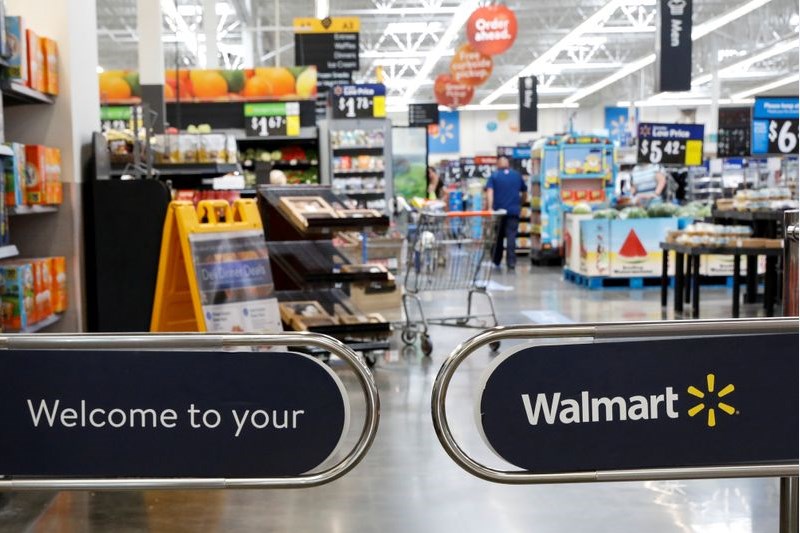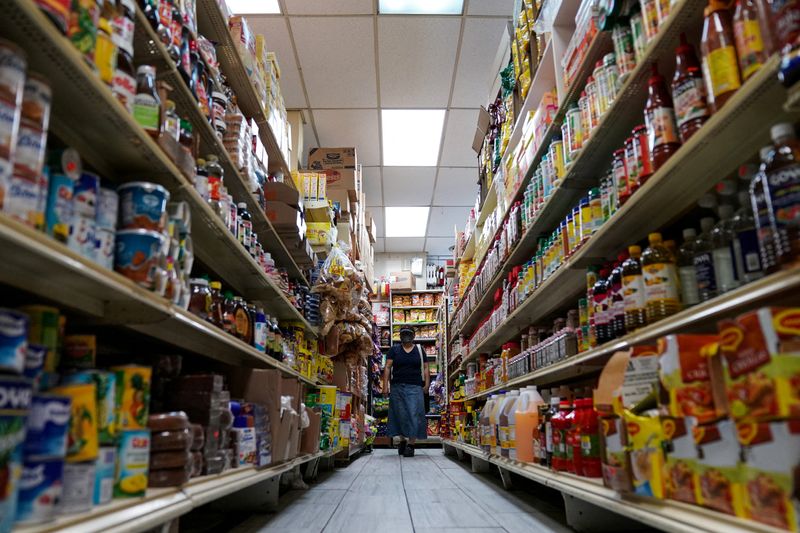Grocery stores should cut prices as costs ease, Biden White House says
Reuters
Published Feb 02, 2024 03:12PM ET
Updated Feb 02, 2024 04:00PM ET

By Trevor Hunnicutt
WASHINGTON (Reuters) - U.S. President Joe Biden's administration is taking aim at grocery chains, sending an election-year suggestion that the companies lower prices on goods from milk to eggs and bread.
"Our message is a very clear one that the president has and will continue to lean into, which is, if you're a company whose input prices have come down and you're not passing those savings along to the consumer, he will call you out," said Jared Bernstein, the chair of Biden's Council of Economic Advisers, in a virtual meeting with reporters.
"We've seen elevated (profit) margins, particularly in the grocery sector, and have taken note that there needs to be more pass-through there (to consumers)."
Bernstein did not name any specific companies.
Grocery giants Walmart (NYSE:WMT), Kroger (NYSE:KR) and Albertsons (NYSE:ACI) are booking 20-plus percent gross profit margins, roughly in line with where they were before the COVID-19 pandemic spiked inflation.
A White House analysis of Census data shows food-and-beverage retailers' revenues as a share of their costs have risen sharply from before the pandemic to a level not seen since the mid-2000s, a measure that they say more directly tracks retail mark-ups.
Last week, Biden said "there are still too many corporations in America ripping people off: price gouging, junk fees, greedflation, shrinkflation." Biden has pushed drug makers to lower insulin costs, hotel chains to reduce fees and tried to diversify the meat-packing industry after beef prices skyrocketed in the aftermath of the pandemic.
Biden's pitch for lower supermarket prices comes ahead of the Democrat's November bid for re-election. A cavalcade of strong economic data - including blockbuster jobs and wage numbers on Friday - has not translated into good approval ratings for Biden, with voters still saying they are concerned about high costs.
Consumer confidence is improving, Bernstein said, citing the University of Michigan consumer survey that showed sentiment rising to its highest level since July 2021 and noting the recent strong U.S. stock market run.
"As inflation continues to ease and the job market remains tight and real wages and wage growth continue to beat price growth, that should start to show up as improved confidence," he said.
"We're also working hard to lower costs - actual lower costs, not just lower inflation," said Bernstein, citing eggs, milk, appliances, airfares, used cars and gas as particularly sensitive areas for Americans.
While eggs only account for 0.1% of the consumer price index, Bernstein said, "in the national psyche it's a lot bigger than that and we're very cognizant of that."
The United Nations food agency's world price index fell in January to its lowest level in nearly three years, driven by declines in cereals and meat.
Kroger and Albertsons plan to close on a proposed $24.6 billion merger later this year, pending an antitrust review amid fears that the deal could raise prices.
"We agree with President Biden," a Kroger spokesperson said. "Too many grocers in America have increased margins in contrast to Kroger."

The spokesperson added that the merger would "lower prices for even more of America's consumers by delivering at least half a billion in additional price investments at Albertsons stores."
A spokesperson for the National Grocers Association, which represents independent grocers, called for stricter antitrust enforcement and said "the nation's largest retailers have used their muscle to force food suppliers to offset higher production costs by charging their smaller rivals higher prices."
Written By: Reuters
Trading in financial instruments and/or cryptocurrencies involves high risks including the risk of losing some, or all, of your investment amount, and may not be suitable for all investors. Prices of cryptocurrencies are extremely volatile and may be affected by external factors such as financial, regulatory or political events. Trading on margin increases the financial risks.
Before deciding to trade in financial instrument or cryptocurrencies you should be fully informed of the risks and costs associated with trading the financial markets, carefully consider your investment objectives, level of experience, and risk appetite, and seek professional advice where needed.
Fusion Media would like to remind you that the data contained in this website is not necessarily real-time nor accurate. The data and prices on the website are not necessarily provided by any market or exchange, but may be provided by market makers, and so prices may not be accurate and may differ from the actual price at any given market, meaning prices are indicative and not appropriate for trading purposes. Fusion Media and any provider of the data contained in this website will not accept liability for any loss or damage as a result of your trading, or your reliance on the information contained within this website.
It is prohibited to use, store, reproduce, display, modify, transmit or distribute the data contained in this website without the explicit prior written permission of Fusion Media and/or the data provider. All intellectual property rights are reserved by the providers and/or the exchange providing the data contained in this website.
Fusion Media may be compensated by the advertisers that appear on the website, based on your interaction with the advertisements or advertisers.